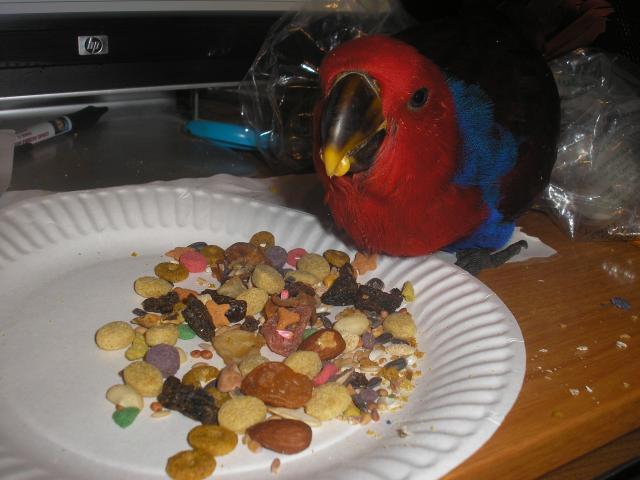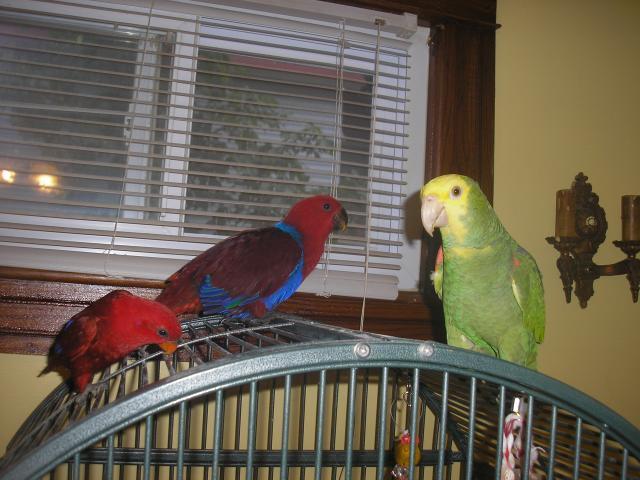She is so pretty. I think she looks like a Jewel
Navigation
Install the app
How to install the app on iOS
Follow along with the video below to see how to install our site as a web app on your home screen.
Note: This feature may not be available in some browsers.
More options
You are using an out of date browser. It may not display this or other websites correctly.
You should upgrade or use an alternative browser.
You should upgrade or use an alternative browser.
Handfeeding my new 2 month old eclectus parrot!
- Thread starter duckncover
- Start date
Quote:
Scarlett is a good name for her.
Scarlett is a good name for her.
- Thread starter
- #33
She's starting to loose interest in the formula about a half a minute into being fed. She starts walking around and it's hard to get her to take anymore but I know she's not full yet. She's in her big cage now and she's doing well with it and can and will climb on all the perches and even sit on top. She enjoys being pet too. She tinkers with her pellets in her cage a little but I don't think she's eating them that much. Oh and finally I've decided to name her Echo.
Last edited:
crtrlovr
Still chillin' with my peeps
Echo is nice ... I just found this thread and was going to suggest something like Chili, Salsa, or Paprika. (can you tell I haven't eaten anything yet today?
 ) Your baby is beautiful. I hope you have long and happy lives together and that she and Paco are good friends for many years to come.
) Your baby is beautiful. I hope you have long and happy lives together and that she and Paco are good friends for many years to come.

- Thread starter
- #35
Well I just gave her another paper plate filled with goodies. She seems to pick out the pellets and weaning o's first which is good that she's not going for the treats first. I have some raisins and other dried fruits in there along with a few different types of nuts, a few seeds, and if course some apple slices and string beans. She is getting more and more interested in eating by herself everyday and it's fun to watch. Here's a picture of her eating!


- Thread starter
- #36
Here's all my big birds on top of Echo's cage together. The 3rd little red bird is Pinto a playful Red Lory Parrot I'm fostering for my local parrot rescue.


- Thread starter
- #37
Yesterday we took her up the park to socialize her with other people and it went great. She seemed to enjoy the attention and being outside. She really likes sitting on top of her cage and just watching everyone. You can start to see the blue ring forming around her eyes too.


Last edited:
Echo is beautiful! A couple of things I'd like to mention. I, too, handraised Eclectus (among many other species) for years, and one thing that people may not be prepared for is the picky phase that they go through right about this age. Are you weighing Echo every day? I ask because when they start to wean themselves, they can be stinkers about not eating enough and can drop weight pretty quickly. Make sure that she's maintaining. As she starts to fledge, she will naturally lose a little "baby fat" due to the increased exercise, but you don't want her to lose too much too quickly. You have mentioned that she's losing interest in the formula quickly already, so I suspect she's going through that phase now. Make sure that she is getting plenty of thick, warming foods like oatmeal with ground nuts mixed in, birdie bread, and/or a mixed-grain-and-legume hot mash, and offer them multiple times throughout the day so that if she's feeling picky and not eating a lot at any given feeding, she will still have plenty of opportunities to eat and get some calories into her. Now is also the time to start introducing her to many other kinds of foods, like sprouted seeds and a variety of vegetables. Ekkies need a lot of dark-colored veggies in their diet, so I would start adding steamed leafy greens (e.g. spinach, kale, chard), green beans, sweet potatoes, carrots, etc. I say steam/cook them because babies tend to prefer warm/cooked foods, and you can add them to a hot mash for easier integration. You can also offer all these cooked foods by hand to increase the bonding experience. Then, as she gets older and used to eating a wide variety of foods, you can start offering her raw veggies.
Also, I completely agree with the person who said to ignore a bite rather than correct it or punish it. What's even better and more effective, though, is to avoid the bite to begin with. If you watch her body language and observe what she's telling you, you will be able to back off before the bite even happens. The best way to teach her not to bite is to not give her the opportunity to do so. Plus, if she learns that you understand and respond to her body language, she will be calmer and happier around you, and you will be reducing the amount of negative interactions she will have with you. If you need some help deciphering parrot body language, Barbara Heidenreich has an excellent DVD about it on her website: www.goodbirdinc.com. You can also learn more about ABA/Positive Reinforcement there. Another great site about behavior and how to avoid bird bites is: www.behaviorworks.org
It sounds like things are going really well for you and Echo right now! So glad to hear that you're socializing her during her critical socialization period! That's important!
Also, I completely agree with the person who said to ignore a bite rather than correct it or punish it. What's even better and more effective, though, is to avoid the bite to begin with. If you watch her body language and observe what she's telling you, you will be able to back off before the bite even happens. The best way to teach her not to bite is to not give her the opportunity to do so. Plus, if she learns that you understand and respond to her body language, she will be calmer and happier around you, and you will be reducing the amount of negative interactions she will have with you. If you need some help deciphering parrot body language, Barbara Heidenreich has an excellent DVD about it on her website: www.goodbirdinc.com. You can also learn more about ABA/Positive Reinforcement there. Another great site about behavior and how to avoid bird bites is: www.behaviorworks.org
It sounds like things are going really well for you and Echo right now! So glad to hear that you're socializing her during her critical socialization period! That's important!
- Thread starter
- #39
She stopped wanting formula from a syringe so I tried a spoon and now she's eating good again. She will also take oatmeal and soaked pellets off a spoon. She isn't too interested in fruits or veggies but I'm working on it. I'm going to try giving her some apple sauce in a little bit so maybe she'll get a taste for apple slices. I need to get a scale but I need to find a good deal. She will also pick at millet spray and crunch up pellets and seeds. She will only pick at solid foods at certain times but when she does she stays interested for quiet a while
Sounds like you're doing a great job. The key to abundance weaning is patience, patience, variety, abundance, and patience. Lots of warm, soft foods, and cooked grain/legume/veggie mixes will keep her full and introduce her to new flavors while she gradually gets used to eating solids. Let her have whatever she wants. I would definitely recommend getting a gram scale sooner than later, though, because daily weights are vital at this point in her life. If she suddenly drops a lot of weight, that can be an indication that she's either going through a finicky phase and not eating as much as you thought, or an early sign of disease or illness. In either case, prompt response and intervention can be the difference between life and death.
Are you aware of www.landofvos.com? It's essential for any Eclectus owner. I would definitely recommend checking it out!
Are you aware of www.landofvos.com? It's essential for any Eclectus owner. I would definitely recommend checking it out!
New posts New threads Active threads
-
Latest threads
-
Flubendazole 1% Individual Dosage?
- Started by Adey65
- Replies: 0
-
-
Ocular Merek's or something else?
- Started by Indian101
- Replies: 1
-
Omlet Eglu Coop and Winter Ice Storm
- Started by Kevinurse
- Replies: 2
-
Cockerel with Pasty Butt??
- Started by KWestVA
- Replies: 0
-
-
Threads with more replies in the last 15 days
-
-
-
BYC's 52-week Photography Challenge. Week 2: (Jan 12-18, 2026). Theme: Flock Star
- Started by Lacy Duckwing
- Replies: 95
-
Help I have a butt pecker
- Started by Hannah2911
- Replies: 52
-
-
×

